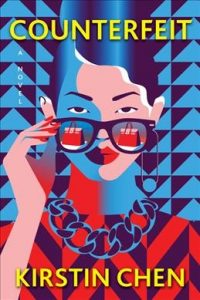 Counterfeit, a fictional fraud-novel by Kirstin Chen, is a fast-paced story that delves deeper than you might expect. The novel is initially narrated by Ava Wong, a Chinese-American Stanford graduate who is taking time away from her corporate law career. At first glance, her life seems perfect, and then Ava reveals that her husband works long hours as a surgeon, her two-year-old has tantrums all day long, and she detests the career that she chose to please her parents. Unexpectedly, Ava runs into her college roommate Winnie Fang, and that is when everything changes.
Counterfeit, a fictional fraud-novel by Kirstin Chen, is a fast-paced story that delves deeper than you might expect. The novel is initially narrated by Ava Wong, a Chinese-American Stanford graduate who is taking time away from her corporate law career. At first glance, her life seems perfect, and then Ava reveals that her husband works long hours as a surgeon, her two-year-old has tantrums all day long, and she detests the career that she chose to please her parents. Unexpectedly, Ava runs into her college roommate Winnie Fang, and that is when everything changes.
When Winnie and Ava were roommates, Winnie was struggling to fit in at Stanford. Winnie left college after one semester, and Ava and her friends always assumed that Winnie had gotten caught in an SAT-taking scandal. Now, Winnie reappears in Ava’s life looking like (literally) a million bucks. Ava is caught off-guard and more than a little jealous of Winnie’s life, until she learns that Winnie’s financial success is built on a foundation of fraud, involving the production and selling of fake luxury handbags. Winnie invites Ava to join her in her scheme, offering Ava the opportunity to make a lot of easy money. Ava is offended and resists until she takes her son on vacation to visit family in China, and finds herself with no money and no access to her finances when her angry husband blocks her access to their credit cards and bank accounts. Unwilling to let her family see the flaws in her family life, Ava does one favor for Winnie and finds herself wrapped up in the fake designer business.
The handbags that Winnie and Ava are selling are not the cheap knock offs that were widely available at flea markets in the 1980s and 90s. These bags are made with the same materials that the designer companies use, and often in the same factories. As Ava learns about the fake designer industry, Winnie challenges her belief system with questions about the value that we assign to designer goods. Eventually, the Chinese women hired by Ava and Winnie to work for them are exposed, which raises the topics of Asian stereotypes and racial profiling. The book also touches on the plight of sweatshop workers and the prevalence of factories that rely on slave labor in countries other than China.
About halfway through the book, the narrator switches to Winnie. Ava’s story paints her as a victim to Winnie’s manipulation and cutthroat business practice, as she pleads her innocence to a police detective. Winnie’s perspective (unsurprisingly) portrays Ava as an intuitive schemer who knows how to use cultural insights and stereotypes to appear innocent. Much like the fake Birkin bags that Ava and Winnie are selling, it is almost impossible for the reader to determine who is the mastermind and who is telling the truth.
This book is fun, quick and engrossing. It has more weight than a light summer beach-read, though, because the author is so skilled at highlighting how culture, expectations, family and business impact Ava and Winnie’s lives. She also brings the value of designer goods, and the power that we grant these luxury items, to light. I admit that I was expecting something else when I bought this book, but I enjoyed it and I definitely recommend it.


